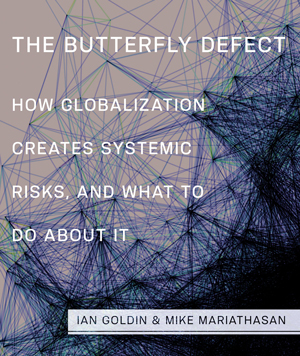By Ian Goldin and Mike Mariathasan
For most of the world’s growing number of inhabitants, greater connectivity has been a blessing. The world is connected; individuals are connected, firms are connected, and governments depend on each other more than ever. Below, Ian Goldin and Mike Mariathasan conclude that insufficiently managed globalization might drive us toward a world of overly complex interdependencies, with the resulting cascading shocks encouraging more local rather than more globally connected politics.
Globalization – A Double-Edged Sword
The world we live in is markedly different from that of just a couple of decades ago. Goods, services, people, and ideas travel across borders more rapidly than ever before. This connectivity has brought about unprecedented improvements in average living and health standards. It has enriched our lives with more information, more choices, and more opportunities. It has also contributed to the mitigation of political tensions. The ending of the Cold War, the opening of China, and the sustained period of peace in Europe, as well as the fall of authoritarian regimes in over 60 countries in Africa, Latin America, and Asia, are part of this extraordinary process. Connectivity has also accelerated the spread of innovations that have changed the lives of millions for the better. For most of the world’s growing number of inhabitants, greater connectivity has been a blessing.
Many, however, see globalization as a curse. They worry about growing inequalities and about those who are excluded from the benefits of closer integration. They also point to systemic risks, including financial crises, environmental destruction, pandemics, cyber attacks, and other cascading threats. We share these concerns, and provide evidence on the reality of a wide array of global systemic risks in our recent book: ‘The Butterfly Defect: How Globalization Creates Systemic Risks, and What to Do about It’. We show that the complexity of the world that we have built may well have escaped our models and cognitive abilities. We are overloading the global networks; we are stretching their capacity beyond what prudence recommends, and too often we neglect the accumulation of a large variety of risks and the geographical concentration of activities in a small number of pivotal nodes.
Managing Global Integration
Globalization requires careful management, ensuring co-operation, inclusivity, and the management of complexity as guiding principles. The many networks and mechanisms on which global integration relies have outgrown the capacities of their governing institutions. Because systemic risk and globalization specifically refer to relationships that transcend national borders, this necessarily also implies the need for co-ordinated national, regional and international institutions. With a few notable exceptions, however, our current institutions are the legacy of the Second World War and the subsequent Cold War, and consequently unfit for twenty-first century purposes. The international financial architecture, for instance, did not suffer from a lack of power, people, resources, or data. The International Monetary Fund, the Bank for International Settlements, and other global financial institutions, as well as their national counterparts, were among the strongest global and national institutions. Their core purpose was global and national financial stability, and yet their advice allowed problems to fester and the global crisis to unfold.
The required renewal must therefore be wide-ranging; it must include a fundamental reassessment of the mandates, the shareholding and governance structures, skills, conceptual models, and operating procedures that guide the work of the international system. This reassessment cannot be a one-time process; given the speed of the evolution of challenges, flexible structures need to be created that allow regular monitoring, evaluation, and the refreshing of skills and mandates.
Connectivity, Accountability and Risk
Globalization has been associated with a growing complexity of relationships and interconnections that have made the attribution of cause and effect more difficult and at times impossible to discern. Citizens feel that they are no longer in control of their destinies. Meanwhile, politicians and others in positions of responsibility are able to hide in the maze of globalized, entangled networks. The sense of diminished control leads people to seek to bring responsibility home and to be more local. The desire to make politics and decision making less remote is one of the adverse effects of globalization, and is giving rise to fragmentation. Overwhelmed by global complexities, citizens and politicians resort to local thinking and short-termism. This not only impairs local and global economic progress and innovation; it also opens the doors to nationalist ideologies and threatens the peace and the relative global political stability that have been painfully achieved over decades.
Globalization is worth preserving, and even deepening. But it must be nurtured and shaped in a manner that ensures that it will be more inclusive, transparent (to provide a better understanding of its complexities and ensure greater accountability), and resilient. Policies are required at the local, national, and global levels to ensure that globalization works for, not against, development.
In The Butterfly Defect, we provide ample evidence of a simple but important fact: the world is connected; individuals are connected, firms are connected, and governments depend on each other more than ever. We can neither halt nor reverse this development; the physical flow of goods and services may still be interrupted by borders and regulations, but virtual exchange overcomes such obstacles easily. We conclude that insufficiently managed globalization might drive us toward a world of overly complex interdependencies, with the resulting cascading shocks and lack of accountability encouraging more local rather than more globally connected politics.
What Do We Need?
Global integration means we can no longer rely on national governments alone to manage global challenges. We have a common responsibility for the world, and we can recognize this responsibility only if we learn to coordinate and to cooperate globally. We need responsive, proactive, and joined-up global capacity. Global institutions need to be more accountable and transparent, but they also need to be given mandates and resources that are relatively immune to the constant buffeting of political tides.
At the same time, not all problems require global collective action. The principle of subsidiarity must apply, because many of the issues are resolvable at the national, regional, or bilateral level or by nongovernmental actors and civil organizations.1 Global management must be considered only where public action pursued by governments in cooperation with one another is necessary to address a problem. Not all actors need to be involved in every global negotiation, and a principle of selective inclusion should be adopted, with the key actors most able to effect solutions but also the countries most affected engaged.
The entire system of global governance needs to be reassessed to identify the needs of our time. There are critical orphan issues that have no institutional homes – among them climate change, cyberspace, and migration. Other issues have international homes, such as the World Health Organization, which is responsible for pandemics and public health, but, like those that have responsibility for finance and poverty reduction, these institutions require urgent renewal.2

Cohesive societies are best able to support the successful management of global challenges. But such societies have to rest on stable foundations: secure information highways, reliable infrastructure, an intact environment, an efficient production sector, a supply of affordable credit, effective education and health systems, and other types of basic social and physical infrastructure. We therefore need institutions that are able to identify the most crucial interdependencies but that also understand the need to equip society for unpredictable failures.
With global risks now emerging within and across many different domains, we cannot afford to neglect the lessons derived from the financial crisis and endure the unnecessary trauma of a systemic collapse for a second time. The consequences may well be more serious, even more costly, and potentially more fatal than those of the financial crisis. Our key conclusions therefore include recommendations to prepare for contingencies, as well as to define and enforce unified legal responsibilities. We summarise them in the following six lessons for global policy reform:
1) Promote resilience and sustainability
Public and private leaders should be aware of the increasing unpredictability of risk and prepare to face unforeseen challenges with resilient organizational forms. This preparation should include fostering flexibility and avoiding over-reliance on single channels and geographical nodes. Sustainability requires taking into consideration the broader context and longer time horizons. Resilience requires the fostering of diversity.
2) Foster the transparent communication of choices, risks, and uncertainties about policy alternatives to address political and attribution challenges
Transparency is being reduced by the increasing complexity and speed of transactions. Leaders need to understand this and respond by increasing transparency. If attribution of responsibilities is impossible, it undermines accountability. Shareholders require information on which to make their decisions, including those with respect to potential sources of instability and risk. Electorates similarly require transparency in order to make rational choices and ensure democratic stability.
3) Improve risk measurement
Due to rising complexity and interdependency, we are reaching our limits in terms of correctly assessing cross-sector and cross-border risks. This does not imply, however, that we should abandon our efforts; rather, we should redouble them. In particular, we should invest in understanding complexity and “big data”.
4) Rectify economic incentives
Research in economics has an important role to play in political responses to the complexities of our times. Salaries, taxes, insurance payments, markets and prices have an important influence on the choices of millions. These choices can harm the environment, create financial risk, or make us vulnerable to infrastructure failures or other risks, including those arising from the virtual domain.
5) Prepare for contingencies
In combination with conducting research on risk management, public actors need to work toward designing contingency plans and the capability to respond to unforeseen risks swiftly. This includes setting aside resources, educating risk and disaster management experts, and defining contingencies for times when global political coordination is suddenly required.
6) Define and enforce unified legal responsibilities
Unifying and enforcing legal responsibilities do not necessarily lead to the assimilation of national legal frameworks. They require, however, that every firm – whether it operates from Taiwan, the Cayman Islands, or the United States – be held to the same standards in terms of its impact on the global stage.
Although globalization is the cause of systemic risk, it is ironically also its solution. More connectivity and openness, rapid change, growing populations, and higher incomes bring greater complexity and higher potential for systemic risk. The cultivation of a resilient globalization, however, is also the best means available to us to manage it. Building firms and societies that focus on sustainability is vital. Core to this, as is emphasised in the Oxford Martin Commission for Future Generations report Now for the Long Term, is the need to overcome short-termism in business and politics. For businesses and societies to thrive, we need to tame The Butterfly Defect which is the underbelly of globalization.
In The Butterfly Defect we have sought to identify the key dimensions of global systemic risk and illustrate through our case studies how this risk has evolved. We identify a real danger that failure to address systemic risk will lead to its becoming more frequent and more threatening. With better management there is the potential for all citizens to share in the remarkable benefits arising from globalization, the most impressive of which could be yet to come.
 This article is an adapted excerpt from Ian Goldin and Mike Mariathasan ‘The Butterfly Defect: How Globalization Creates Systemic Risks, and What to Do about It’, Princeton University Press, 2014.
This article is an adapted excerpt from Ian Goldin and Mike Mariathasan ‘The Butterfly Defect: How Globalization Creates Systemic Risks, and What to Do about It’, Princeton University Press, 2014.
 Ian Goldin is director of the Oxford Martin School and professor of globalization and development at the University of Oxford. He has served as vice president of the World Bank and an advisor to President Nelson Mandela. In addition to his latest book, The Butterfly Defect, his recent books include Divided Nations, Globalization for Development, and Exceptional People.
Ian Goldin is director of the Oxford Martin School and professor of globalization and development at the University of Oxford. He has served as vice president of the World Bank and an advisor to President Nelson Mandela. In addition to his latest book, The Butterfly Defect, his recent books include Divided Nations, Globalization for Development, and Exceptional People. Mike Mariathasan is assistant professor of finance at the University of Vienna.
Mike Mariathasan is assistant professor of finance at the University of Vienna.
References
1.These principles that Ian Goldin developed with his Oxford colleague Ngaire Woods are explored more fully in Ian Goldin, Divided Nations: Why global governance is failing, and what we can do about it, Oxford University Press, Oxford, 2013, pages 174–176.
2. We refer readers who are interested in the reform of global governance systems to Goldin, Divided Nations, 2013.


































































